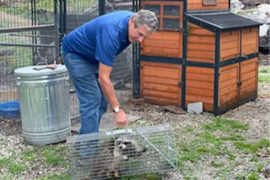In our age of celebrity and partisan politics, “narcissism” is a word that is much bandied about. But Vanessa Reiser — a clinical therapist and social worker from Congers — says that this psychological disorder is not about taking selfies or even about being self-centered or selfish.
“The way people use this word it’s a total misnomer,” she says. “Narcissism is a personality disorder. Most of the time, these people have a fractured sense of self. In order to feel whole, they have to manipulate others.”
Reiser has firsthand experience with the subject. As a psychotherapist licensed to practice in New York, New Jersey and Massachusetts, she has some 300 clients who are victims of narcissistic abuse, about 60% of whom are partners of narcissists, most of those partners being women; and 40% of whom are children of narcissistic parents, with a few siblings of narcissists as well. (An underreported facet of this phenomenon, she says, is that of abused workers, as corporate leadership is one of the arenas to which narcissists gravitate. “But then,” she adds, “we’re expected to take sh—from our bosses, right?”) Reiser connects victims of narcissistic abuse with clinical specialists nationwide through her nonprofit tellatherapist.org. (Tellatherapist.net is her practice.)
But she’s also experienced a narcissistic relationship that resulted in verbal abuse, professional threats and property damage. Now the two-time Ironman is donning her running shoes — and a wedding dress — for a 285-mile run that will begin May 17 and end May 29 in J. Hood Wright Park in Manhattan. The goal is to raise awareness and $200,000 for domestic violence shelters in Oswego, Onondaga, Madison, Otsego, Delaware, Sullivan, Orange and New York counties, which she will pass through on her way. Domestic violence shelters have reported an increase between 6 and 21% in calls since the pandemic began, with the largest increase in the first five weeks after the quarantine began. (In New York, the calls rose as much as 70%.) All domestic abuse, Reiser says, is narcissistic abuse.
She started training for her run in October and has been averaging about 20 miles a day. She’s also looking for sponsors for the event, which she sees as a means to help clarify a seemingly familiar but much-misunderstood disorder, whose characteristics include arrogance, lack of empathy, a sense of entitlement and an obsession with the spotlight.
“Narcissists don’t want to change,” she says of a condition that may be spurred by both biological and social factors and remains a challenge to treat. “They think they’re better than they are and anyone else.”
Instead of self-improvement, what they’re looking for is “a constant supply of attention.”
“Think of a toddler: ‘Daddy, look at me,’” Reiser says. “To get that supply, they will manipulate, triangulate (pit one person against another) and cheat.” Ignoring personal boundaries, the narcissist will build you up, only to tear you down to build you up again, which Reiser calls “wound and soothe.” Special occasions are a particularly vulnerable time.
“They always ruin holidays and birthdays,” she says. “They take a sh—on everything.”
All of this is in an effort to attain and retain power and exert control. (Interestingly, narcissists are often animal lovers, she adds, because they think it’s easy to control a pet like a dog, which provides unswerving devotion.)
Because the narcissist has no self-awareness and is never wrong, truth is always a casualty. “Narcissists are constantly lying,” she says of an approach in which one day vanilla is chocolate but the next day it’s strawberry. How, then, to deal with someone who makes you feel as if you’re always walking on shifting sand? While it might be best to avoid narcissists altogether, we can’t choose our family and co-workers and are sometimes sucked into a romantic relationship with a narcissist before we’re aware of the web that’s been woven.
We ran several coping strategies by Reiser, each of which has its own pitfalls:
- Engage the narcissist head-on. This is almost always an exit strategy. Be prepared to walk away — and face the consequences of rejecting one who refuses delivery of rejection. Reiser says she is still coping with the fallout of her relationship with a narcissist.
- Kiss up, kick down. This is often applied in the workplace by sycophants and enablers — the so-called “flying monkeys,” after the Wicked Witch of the West’s companions in “The Wizard of Oz” — who suck up to the narcissist, usually a boss, by throwing colleagues and underlings under the bus. Just remember, though, that the people you abuse on the way up are those with long memories whom you will encounter on the way down.
- Tap your inner double agent. This is probably the most effective strategy and yet, it is the most dangerous of all. You try to go along to get along, all the while working behind-the-scenes in counterpoint to create the best environment for yourself and others. What makes this risky is that you are going to have to identify allies early on to succeed. Creating a support team that will remain loyal isn’t easy.
- As for those who suffer at the hands of narcissists, Reiser has a simple message:
“I believe you. I see you. We see you. And we can get you the help you need to be safe.”
For more, visit tellatherapist.net and tellatherapist.org.






